
 i_need_contribute
i_need_contribute

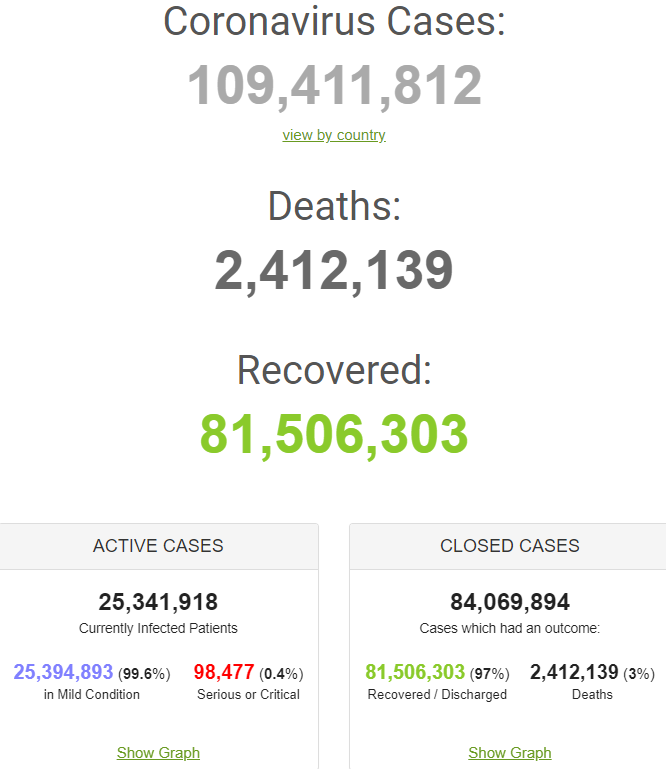
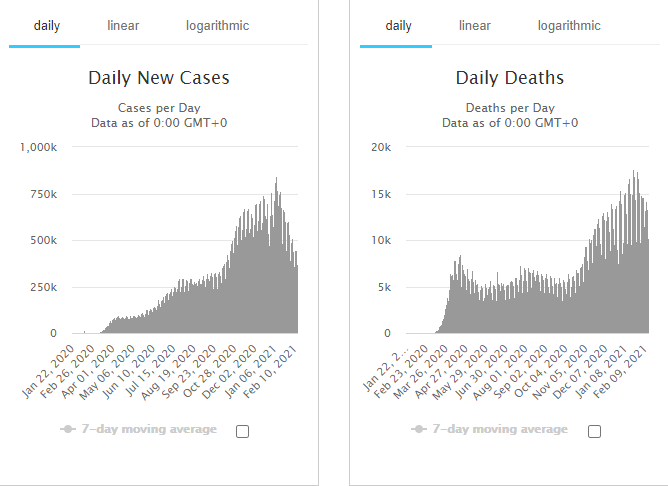
|
Country, |
Total |
New |
Total |
|
World |
109,381,101 |
+290,097 |
2,410,994 |
|
28,261,470 |
+64,297 |
497,174 |
|
|
10,916,172 |
+11,434 |
155,764 |
|
|
9,834,513 |
+23,258 |
239,294 |
|
|
4,071,883 |
+14,185 |
80,126 |
|
|
4,038,078 |
+10,972 |
117,166 |
|
|
3,465,163 |
+16,546 |
81,814 |
|
|
3,056,035 |
+14581 |
64,747 |
|
|
2,721,879 |
+11,068 |
93,577 |
|
|
2,586,183 |
+6,287 |
27,471 |
|
|
2,341,701 |
+4,796 |
65,566 |
|
|
2,195,039 |
+4,923 |
57,605 |
|
|
2,025,798 |
+4,245 |
50,236 |
|
|
1,988,695 |
+9,741 |
173,771 |
|
|
1,588,955 |
+5,334 |
40,807 |
|
|
1,518,263 |
+7,390 |
58,945 |
|
|
1,491,807 |
+1,744 |
47,899 |
|
|
1,271,143 |
+3,094 |
24,330 |
|
|
1,235,298 |
+8,093 |
43,703 |
|
|
1,217,468 |
+6,765 |
33,183 |
|
|
1,088,028 |
+5,126 |
18,187 |
|
|
1,029,284 |
+3,447 |
14,816 |
|
|
825,785 |
+2,432 |
21,293 |
|
|
785,756 |
+1,677 |
15,321 |
|
|
776,209 |
+3,814 |
19,541 |
|
|
761,963 |
+1,872 |
19,366 |
|
|
737,115 |
+1,895 |
21,634 |
|
|
724,380 |
+2,534 |
5,388 |
|
|
643,852 |
+2,224 |
13,179 |
|
|
563,029 |
+1,404 |
12,307 |
|
|
549,176 |
+1,928 |
11,515 |
|
|
540,592 |
+326 |
8,274 |
|
|
478,474 |
+339 |
8,477 |
|
|
433,487 |
+1,184 |
8,211 |
|
|
420,879 |
+1,386 |
4,230 |
|
|
414,472 |
+1,318 |
6,912 |
|
|
387,462 |
+1,707 |
13,706 |
|
|
372,732 |
+322 |
6,433 |
|
|
348,772 |
+3,167 |
1,014 |
|
|
347,250 |
+2,447 |
4,455 |
|
|
339,129 |
+2,130 |
3,993 |
|
|
332,179 |
+487 |
5,636 |
|
|
272,718 |
+104 |
2,054 |
|
|
268,687 |
+1,658 |
1,849 |
|
|
267,223 |
+1,696 |
15,321 |
|
|
265,557 |
+357 |
3,352 |
|
|
264,269 |
+2,464 |
965 |
|
|
237,657 |
+198 |
5,318 |
|
|
236,036 |
+938 |
11,155 |
|
|
232,123 |
+128 |
3,180 |
|
|
229,768 |
+873 |
2,944 |
|
|
229,679 |
+163 |
9,624 |
|
|
223,244 |
+740 |
7,544 |
|
|
209,582 |
+786 |
3,948 |
|
|
204,362 |
+295 |
2,292 |
|
|
201,801 |
+837 |
2,540 |
|
|
190,734 |
+385 |
3,072 |
|
|
179,477 |
+329 |
3,717 |
|
|
177,701 |
+798 |
1,003 |
|
|
173,813 |
+611 |
9,994 |
|
|
172,128 |
+662 |
6,126 |
|
|
170,186 |
+381 |
3,651 |
|
|
169,167 |
+145 |
3,141 |
|
|
167,604 |
+804 |
1,933 |
|
|
167,279 |
+208 |
6,124 |
|
|
159,788 |
+764 |
3,857 |
|
|
157,244 |
+440 |
255 |
|
|
147,092 |
+788 |
2,194 |
|
|
146,184 |
+520 |
1,752 |
|
|
144,042 |
+599 |
2,936 |
|
|
141,601 |
+16 |
3,189 |
|
|
137,306 |
+684 |
1,542 |
|
|
133,218 |
+475 |
1,279 |
|
|
127,354 |
+473 |
2,018 |
|
|
112,742 |
+640 |
403 |
|
|
110,711 |
+198 |
2,939 |
|
|
102,867 |
+75 |
1,795 |
|
|
97,052 |
+180 |
2,989 |
|
|
93,075 |
+1,088 |
1,555 |
|
|
89,763 |
+7 |
4,636 |
|
|
85,475 |
+34 |
1,441 |
|
|
83,525 |
+326 |
1,522 |
|
|
79,416 |
+35 |
622 |
|
|
76,706 |
+424 |
1,451 |
|
|
69,437 |
+983 |
951 |
|
|
68,921 |
+445 |
890 |
|
|
66,501 |
+109 |
592 |
|
|
59,800 |
+14 |
29 |
|
|
52,884 |
+185 |
607 |
|
|
52,416 |
+667 |
495 |
|
|
50,319 |
+312 |
710 |
|
|
50,265 |
+1,130 |
535 |
|
|
48,909 |
+450 |
535 |
|
|
38,289 |
+806 |
266 |
|
|
35,952 |
+155 |
388 |
|
|
35,172 |
+68 |
1,400 |
|
|
32,513 |
+123 |
221 |
|
|
8,803 |
+9 |
166 |
|
|
7,413 |
+13 |
68 |
|
|
2,228 |
+33 |
3 |
Retrieved from: https://www.worldometers.info/coronavirus/
From CNN's Chandler Thornton in Hong Kong
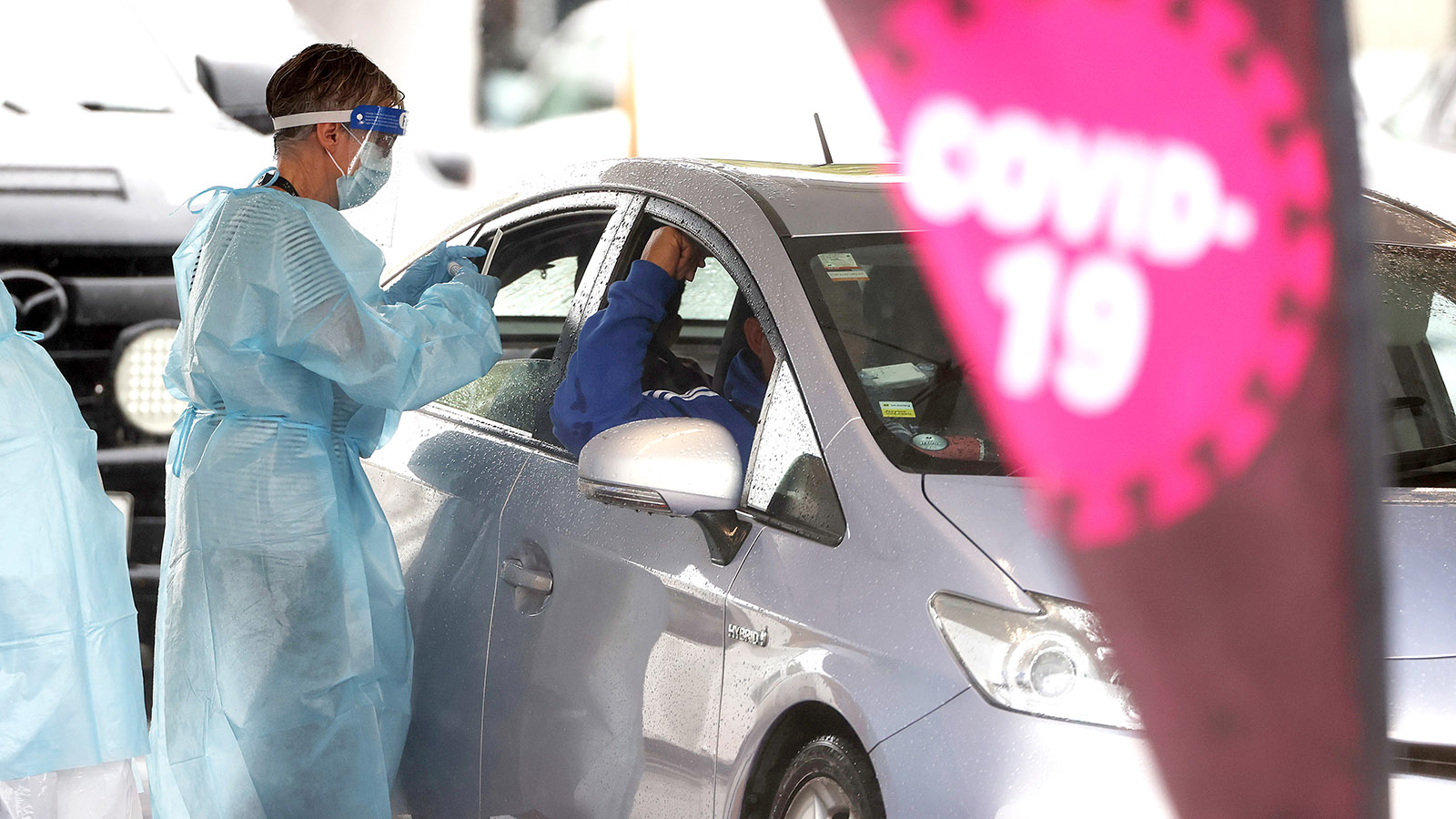
People get tested for Covid-19 at a busy testing station in Otara Town Centre on February 15, in Auckland, New Zealand. Fiona Goodall/Getty Images
Two of the three new Covid-19 cases that sent the New Zealand city of Auckland into lockdown are confirmed to be variant of the virus first detected in the UK.
The three local Covid-19 cases announced on Sunday are a mother, father and daughter from the same South Auckland household, Director-General of Health Dr. Ashley Bloomfield said Sunday at a news conference. Prime Minister Jacinda Ardern said one of the trio works in a facility that does the laundry for airlines.
Auckland Mayor Phil Goff told CNN authorities believe the individual's employment may be "the connection" to the virus.
Those cases prompted authorities to enact a three-day lockdown for all of Auckland, a city of about 1.5 million people and the country's biggest population center, starting Sunday at 11:59 p.m.
"We have been dealing with more transmissible versions, mutations of Covid-19. We are wanting to be very cautious. So that's why we've taken this very cautious approach," Ardern said. "What we want people to do is stay home. And so for the next 72 hours if you're in Auckland, please stay home."
Goff said New Zealand has found success containing the virus when authorities "go strongly and go early."
"The government made the decision, consulting with us in Auckland, that we should respond in the same way this time," he said. "So after a beautiful weekend of watching the America's Cup yacht races, and people enjoying the sunshine and the beaches and the parks and at the festivals, suddenly we're in a 72-hour lockdown."
Goff said 6,000 to 7,000 people will now be tested for the virus, and if those tests come back clean, authorities may be able to lift the new stringent measures.
No new cases were reported Monday, the country’s Ministry of Health said in a statement
From CNN's Niamh Kennedy
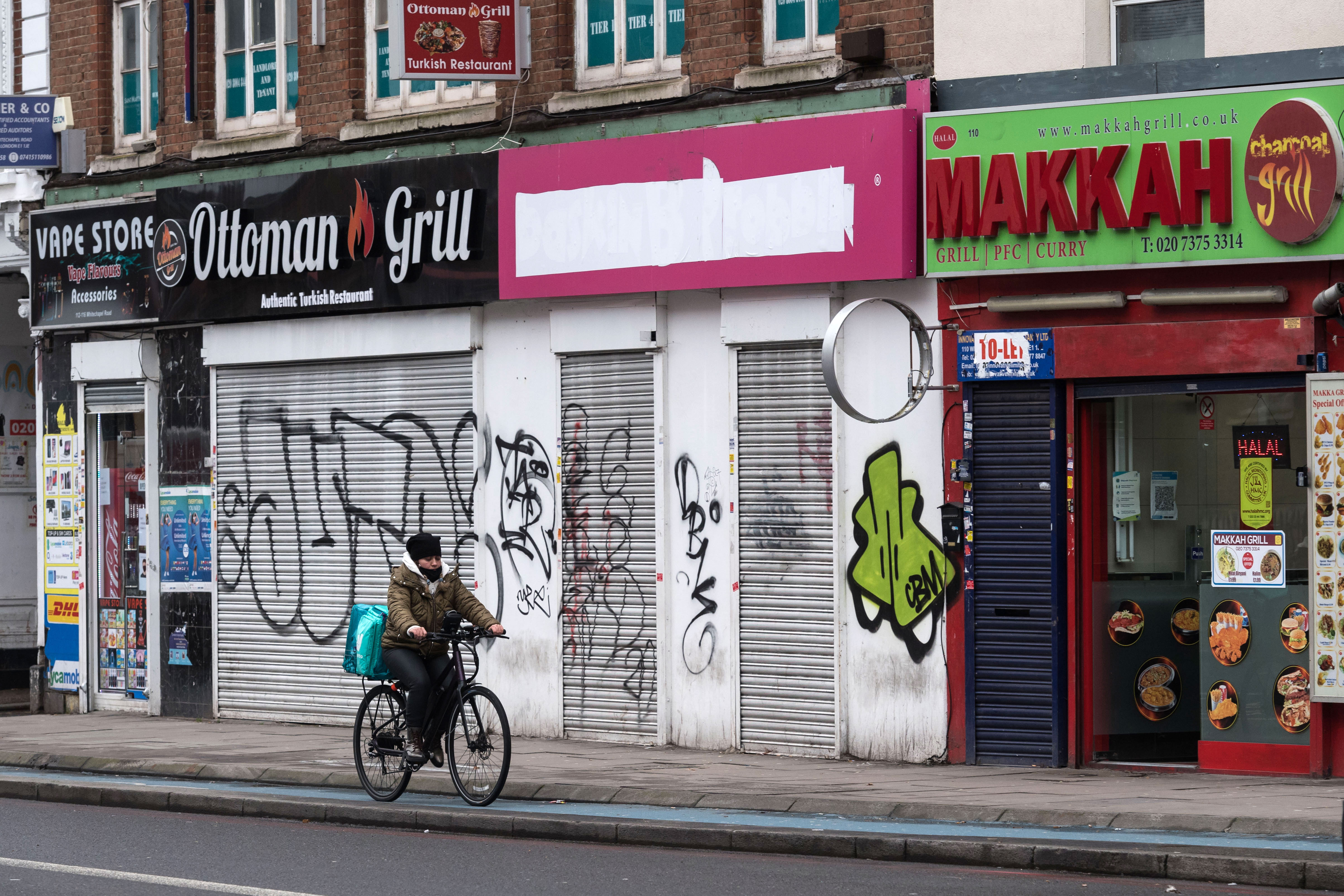
A person rides past some closed restaurants in London on February 1. Wiktor Szymanowicz/Barcroft Media/Getty Images
Dozens of politicians from UK Prime Minister Boris Johnson's own Conservative party have called for an end to lockdown measures at the end of April, when the country’s nine top-priority groups are due to have had a first dose of coronavirus vaccine.
Lawmaker Steve Harvey posted a letter on Twitter Saturday which he said was signed by 63 Conservative lawmakers.
"Once all nine priority groups have been protected by the end of April, there is no justification for legislative restrictions to remain," the letter says.
The letter argues that the "national priority" of reopening UK schools to students "must be achieved by March 8."
Responding on Sky News Sunday, UK Foreign Secretary Dominic Raab said he didn't think "you could set an arbitrary target and not be evidence led."
The UK has helmed one of the world's fastest vaccination efforts, with Raab saying it "is on course to hit the first milestone" on Monday of giving a first dose to its four top priority groups. The UK has decided to focus on giving a first dose to as many people as possible, then give the second dose when supplies allow.
England and Scotland have been under lockdown since early January, with Wales and Northern Ireland under lockdown since late December.
The group, while commending the "tremendous pace of the vaccine rollout," stressed that the government's "roadmap must demonstrate how the vaccine rollout translates into a return to normal life."
The group called for the reopening of pubs, restaurants, and other hospitality venues by Easter, "in a way which enables them to be Covid secure but also to operate in a commercially viable manner."
The vaccine should not only provide "us with immunity from Covid but it must also give us permanent immunity from Covid-related lockdowns and restrictions," they concluded.
From CNN's Ben Wedeman
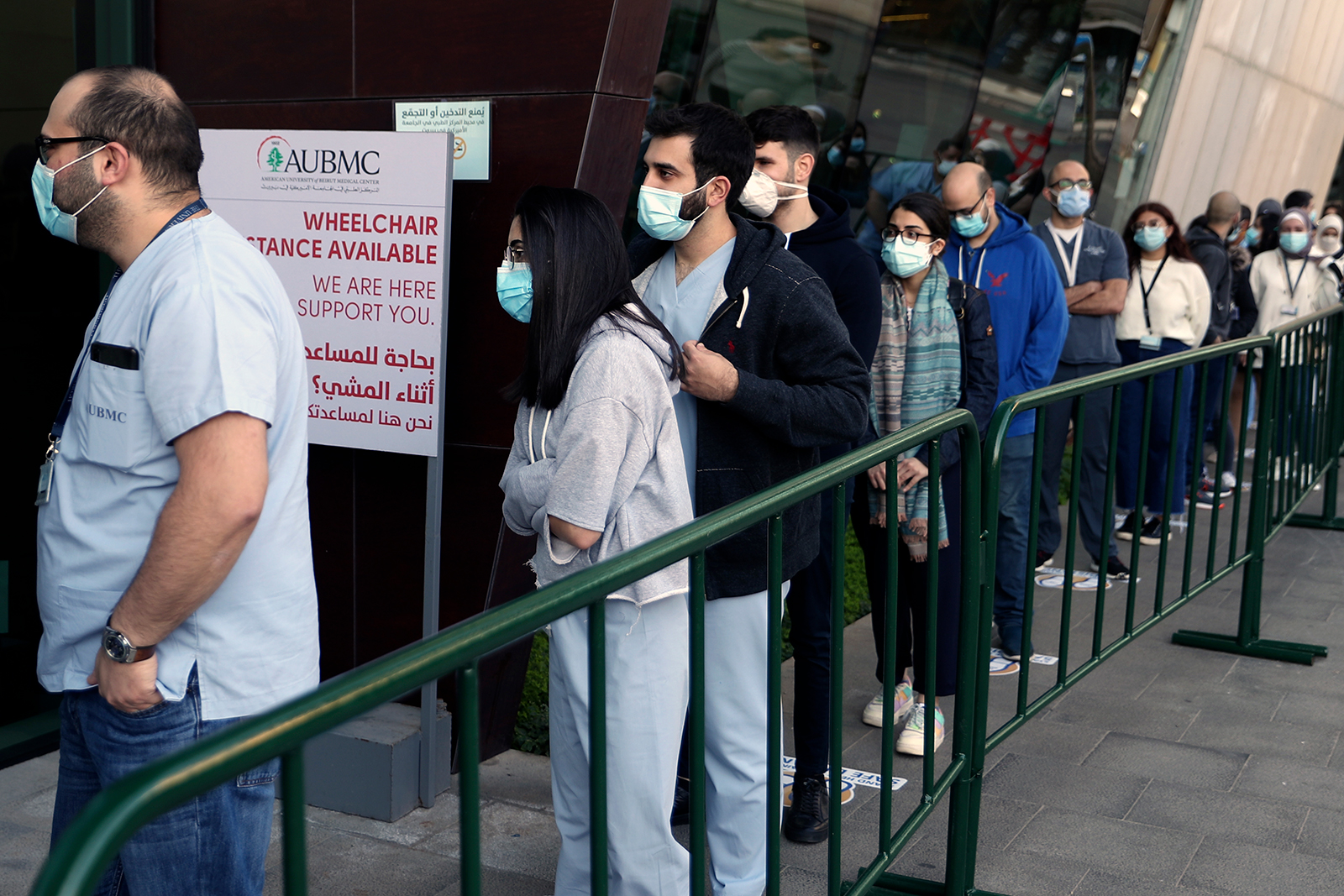
Frontline medical workers stand in line to get the Pfizer-BioNTech COVID-19 vaccine during a nationwide vaccination program at the American University Medical Center in Beirut, Lebanon, on February 14. Bilal Hussein/AP
Lebanon is starting its coronavirus vaccination campaign today, with 90 staff members at the Rafiq Hariri Hospital in Beirut set to be inoculated.
The first person to get the vaccine is Dr. Mahmoud Hasoun, the head of the Covid-19 ward, according to hospital spokesman Nisreen Husseini.
The vaccinations will take place in 10 cubicles at the hospital complex, with ambulances parked nearby in case anyone experiences side effects.
Ferid Belhaj, World Bank Vice President for the Middle East and North Africa, has urged priority groups to get vaccinated first.
He also said authorities should avoid "Wasta" to fast-track getting the vaccine – an Arabic term referring to using one’s connections or influence. A total of two million doses will be delivered in the coming weeks, he said on Twitter on Saturday.
Lebanon's first shipment of the Pfizer/BioNTech vaccine landed at the Beirut International Airport early Saturday evening and was received by Minister of Health Hamad Hassan.
From CNN's Sharif Paget
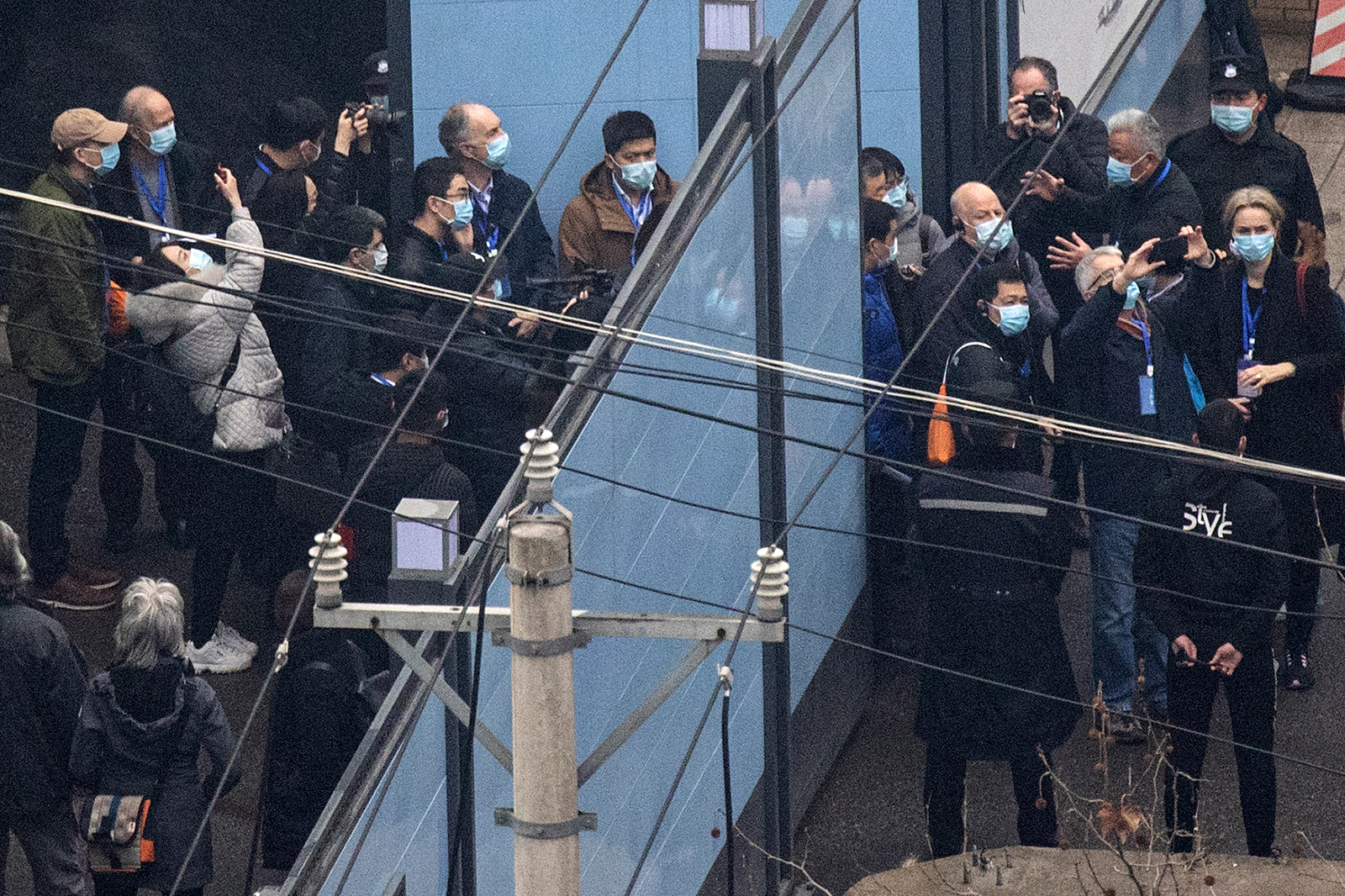
Investigative team members from the World Health Organization visit Huanan seafood market in Wuhan, China, on January 31. Getty Images
China slammed the United States on Sunday, after US National Security Adviser Jake Sullivan released a statement questioning the World Health Organization's investigation into the start of the pandemic.
"What the US has done in recent years has severely undermined multilateral institutions, including the WHO, and gravely damaged international cooperation on Covid-19," said a spokesperson for the Chinese Embassy in the United States in a statement.
"But the US, acting as if none of this had ever happened, is pointing fingers at other countries who have been faithfully supporting the WHO and at the WHO itself," the statement said.
Sullivan's statement: On Saturday, Sullivan had released a statement calling on China to "make available its data from the earliest days" of the Covid-19 outbreak.
Sullivan wrote that the Biden administration has "deep concerns about the way in which the early findings of the COVID-19 investigation were communicated and questions about the process used to reach them."
It is imperative that this report be independent, with expert findings free from intervention or alteration by the Chinese government," the statement read.
Retrieved from: https://edition.cnn.com/world/live-news/coronavirus-pandemic-vaccine-updates-02-15-21/index.html

Peter Daszak, a member of the W.H.O. team, in Wuhan, China, this month. He is primarily concerned with the animal origins of the virus.Credit...Hector Retamal/Agence France-Presse — Getty Images
A team of experts selected by the World Health Organization to investigate the origins of the coronavirus returned last week from Wuhan, China, site of the world’s first outbreak. Having broken the ice with Chinese scientists, the team plans to produce a joint report on the possible origins of the virus.
The two groups of scientists agreed to pursue some ideas that the Chinese government has been promoting, like the possibility that the virus was transported on frozen food. But the W.H.O. team also became frustrated by China’s refusal to turn over raw data for analysis.
Peter Daszak, a member of the W.H.O. team and the president of EcoHealth Alliance in New York, is primarily concerned with the animal origins of the virus. A specialist in animal diseases and their spread to humans, Dr. Daszak has worked with the Wuhan Virology Institute, a collaboration that last year prompted the Trump administration to cancel a grant to his organization.
In an interview after his return to New York, he said that the visit had provided some new clues, which all of the scientists, Chinese and international, agreed most likely pointed to an animal origin within China or Southeast Asia. The scientists have largely discounted claims that the virus originated in a lab, saying that possibility was so unlikely that it was not worth further investigation.
He reflected on the atmosphere in Wuhan and his first glimpse of the seafood market where the initial outbreak occurred last year, although it was not the site of the first cases. He also said the path ahead would be straightforward scientifically, but not politically.
The W.H.O. investigation was the subject of a sharp exchange over the weekend between the U.S. and Chinese governments. Jake Sullivan, the national security adviser, said Saturday that the Biden administration had “deep concerns” about its early findings and how they were communicated.
“It is imperative that this report be independent, with expert findings free from intervention or alteration by the Chinese government,” he said in a statement.
In response, the Chinese government asked whether the United States could be considered a credible partner in the matter, having only recently rejoined the W.H.O. after withdrawing during the Trump administration.
“What the U.S. has done in recent years has severely undermined multilateral institutions, including the W.H.O., and gravely damaged international cooperation on Covid-19,” the Chinese Embassy in Washington said in a statement.
“But the U.S., acting as if none of this had ever happened, is pointing fingers at other countries who have been faithfully supporting the W.H.O. and at the W.H.O. itself,” it continued. “With such a track record, how can it win the confidence of the whole world?”
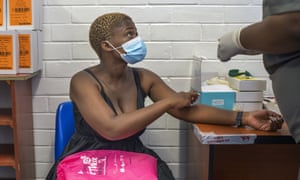
Thabisle Khlatshwayo gives a blood sample before receiving her second vaccine shot at Soweto’s Chris Sani Baragwanath hospital outside Johannesburg. Photograph: Jérôme Delay/AP
African countries may suffer in the global rush for vaccines because they are unable to gather statistics that reveal the true extent of the spread of Covid among their populations, epidemiologists and other experts fear.
According to data from Johns Hopkins university, there have been 3.7m confirmed cases in Africa, and the landmark figure of 100,000 confirmed deaths is likely to be reached within days.
A series of studies has raised fears that the official figures are a significant underestimate, raising the possibility that Africa may not be seen as a priority for scarce global vaccine supplies despite the urgent need.
Many African countries are unable to afford mass testing and lack capacity to collect reliable data on cases and deaths, especially in remote areas. Stigma attached to the disease, a lack of information and victims’ inability to either reach or pay for health facilities may also reduce reporting.
The World Health Organization has said the “unique socio-ecological make-up in a number of African countries means a slower rate of transmission, and fewer severe cases as compared to the hardest hit countries”.
Mortality rates have been relatively low across Africa compared with other regions, though they are rising.
Dr Oliver Watson, an infectious disease expert at Imperial College London, said the shortcomings in data collection on the continent could undermine efforts to secure equitable access to vaccines.
“Some might argue the need for vaccines is much less urgent … so the vaccines will go to countries with stronger reporting systems and so further entrench inequity,” he said.
A study by scientists from ICL’s Covid-19 response team in Sudan found that only about 2% of Covid deaths had been reported in the capital, Khartoum, through most of last year. As a result, the team estimated that as many as 16,090 deaths may have been unaccounted for as of 20 November. Sudan has officially recorded fewer than 30,000 cases and 1,849 deaths.
According to UK Sudan’s Doctors’ Association, 40 doctors are thought to have died of Covid in the country between March and January. As of 6 February, 1,107 health staff had been tested for Covid with 76% returning a positive result.
Dr Ibrahim Fahal, the president of the UK-based Sudan Medical Care Foundation, said frontline medical staff faced acute shortages of PPE, limited safety measures and very large numbers of patients. “They are very exposed,” he said. “A way to get them vaccines has to be found and as soon as possible.”
A study by the Boston University School of Public Health in Zambia concluded that Africa’s relatively low numbers of Covid cases might simply be “a matter of lack of testing, with the coronavirus actually taking a terrible but invisible toll across the continent”.
The study, which is expected to be published in the British Medical Journal in the coming days, found that more than 15% of recently-deceased people arriving at the main morgue in the capital, Lusaka, over the summer tested positive for Covid. Despite most having had symptoms, few were tested before death.
Retrieved from: https://www.theguardian.com/world/2021/feb/15/lack-of-covid-data-may-leave-african-countries-behind-in-vaccine-rush
Here are the key developments from the last few hours:
· All UK nationals or residents arriving back in England from high-risk countries will begin checking into government-designated accommodation on Monday as the hotel quarantine regime to prevent the spread of new coronavirus cases begins.People returning to England from 33 “red list” countries – comprised of hotspots with Covid-19 variants in circulation – will be required to quarantine in hotels for 10 days.
· UK variant hits New Zealand. Aucklanders awoke on Monday to a new lockdown, hoping the short and sharp three-day restrictions ordered by Jacinda Ardern arrest the spread of Covid-19. The prime minister said genomic testing had shown that the three community cases were the UK variant of Covid-19, the first to be detected in the country.
· In the US, the head of the Centers for Disease Control and Prevention said on Sunday it is “absolutely” too soon to lift mask mandates, citing daily Covid case numbers that despite recent declines remain more than double the levels seen last summer.
· US daily Covid cases dropped below 100,000. Average daily new coronavirus cases in the US have dipped below 100,000 for the first time in months, but experts cautioned on Sunday that infections remain high and precautions to slow the pandemic must remain in place.
· First vaccine doses arrive in Australia. Australia’s coronavirus vaccine rollout will begin next week after the first doses of the Pfizer jab arrived in Sydney, AAP reports. More than 142,000 doses are being taken to a secure location and batches will be assessed for damage and quality in the coming days.
· First vaccine doses arrive in New Zealand. Jacinda Ardern said the first vaccine doses arrived in the country on Monday morning. After being checked for quality assurance, inoculations will begin on Saturday, starting with border workers.
· Japan to start vaccinations on Wednesday. Japanese prime minister Yoshide Suga announced on Monday that that coronavirus vaccinations will start on Wednesday this week.
· South Korea to exclude people over 65 from AstraZeneca vaccines. South Korea will initially exclude people aged 65 years and older from inoculation with AstraZeneca’s coronavirus vaccine because of a lack of data proving its efficacy in the elderly, the Korea Disease Control and Prevention Agency said on Monday.
· Pfizer/BioNTech jab gives 94% protection, Israeli study suggests. An Israeli study of more than half a million fully vaccinated people indicated the Pfizer/BioNTech jab offered 94% protection against Covid-19, according to the country’s largest healthcare provider.
· Australia suspended quarantine-free travel with New Zealand after it locked down Auckland following the detection of three new community cases.
· Around 1,000 people have been caught flouting restrictions in a Belgrade nightclub, Serbia’s interior ministry said on Sunday. The country’s coronavirus restrictions allow gatherings of up to five.
· Lebanon has started vaccinating high-risk groups, including healthcare workers and elderly people.
· Brazil has confirmed two cases of the UK variant in the state of Goiás after sequencing test samples taken on 31 December, Reuters reports, citing the state’s health department. It did not say if these are the first cases of the variant detected in Brazil.
· Rwanda has started vaccinating healthcare workers and other high-risk groups, its health ministry has said, making it the first country in east Africa to start its rollout.
· There is growing controversy over a World Health Organization investigation into the origins of the Covid-19 pandemic after one of its members said China had refused to hand over key data, and the US national security adviser said he had “deep concerns” about the initial findings.
· China reported 9 new Covid-19 cases vs 7 a day earlier. China reported nine new coronavirus cases in the mainland for 14 February, compared to seven a day earlier, the health commission said on Monday. Of the cases, eight were imported infections originating overseas, while one case was recorded in Hebei province, which surrounds Beijing, the National Health Commission said in a statement.